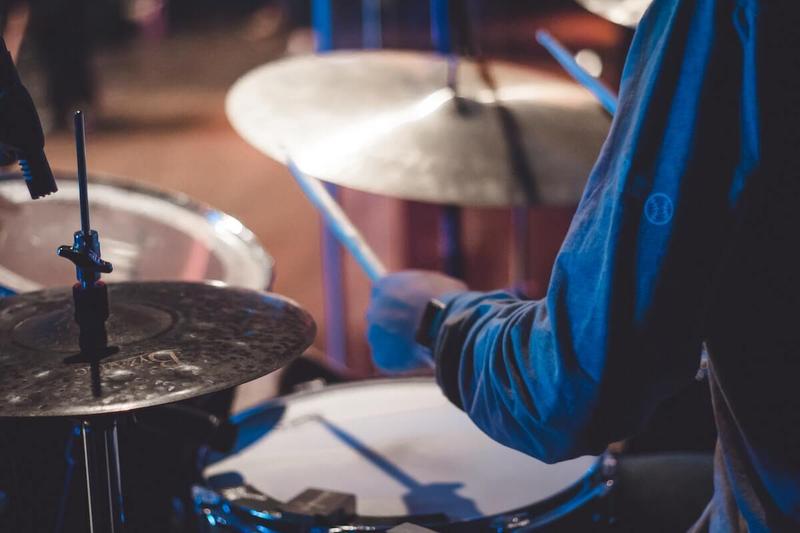Drum Teacher Explains: Can Anyone Learn The Drums?

If you’re anything like me, you think drums are one of the coolest instruments going. Like my teenage self, you might also have wondered whether one day you could learn to play them… Well, I’m here to help answer that question. Here’s what I’ve learned about what it takes to become a drummer from countless gigs, years of teaching, and over a decade of playing.
Virtually anybody can learn to play drums, despite the association with bulky equipment, soundproofed studios, and seemingly impossible feats of coordination. You don’t need any innate skill, expensive equipment, or professional tuition to get started. All you need to begin is your hands and feet, along with time and patience.
In this article I’m going to delve into what it takes to become a drummer. This includes where to start, the barriers to entry, and how to move forward once you’ve made the decision to learn.
You might be surprised at just how easy it is to start drumming when you set your mind to it.
Table of Contents
Can I really learn to play the drums?
Most likely, yes you can! In fact, you can get started this instant without so much as leaving your chair. Begin counting “1, 2” repeatedly. On “1”, stomp your right foot on the ground. On “2”, tap a surface with your left hand.
Voila.
You’ve just played the basis for almost every contemporary piece of music in existence. To take it up a notch, try tapping your right hand on both counts too. If you managed that, and it didn’t make your head hurt too much, becoming a fully-fledged drummer is well within your reach.
There will of course be some exceptions regarding who can learn.
For instance, those who are disabled (physically or otherwise) can certainly have a tougher time of it. Even then however, all is not lost.
Take a look at Def Leppard’s drummer, Rick Allen. After 6 years playing for the band, he lost his left arm in an accident. It took him a lot of dedicated practice and a new approach, but eventually he was back to playing everything he used to. There’s more than a few examples of this too. Check out Jack Thomas, another one-armed drummer that has done incredibly well despite his unfortunate circumstances.
So, if you’re mostly able-bodied and have the inclination there’s nothing stopping you.
Not everyone is going to become the next Buddy Rich, but there’s no doubt in my mind that almost anyone can hold a beat if they put in some work.
Don’t I need a real kit to learn drums?
Short answer: No, up to a point.
As demonstrated above you can learn a lot without so much as picking up a pair of sticks, let alone splashing out on a full kit. However as you can probably imagine, slapping your thighs and stomping your feet will only get you so far.
The longer you go without sticks, the more work you’ll have waiting for you when you finally get some. There’s a lot of technique behind great drumming – especially on your hands – so the sooner you can get sticks to practice with the better.
When it comes to getting a full kit, you’ll definitely feel the benefits of hitting real drums quickly. The difference in stick response between a homemade pillow-kit and the real deal is shocking, and certainly takes some getting used to.
The sooner you start, the more adapted to real playing you’ll be. However, this isn’t the most important thing about getting a real drum kit in my opinion. Instead, it’s your enjoyment that really counts.
There’s something magical about the air shaking around you as you play along to your favourite songs; that feeling alone will keep you committed far longer than any strict routine ever could.
How much do I have to practice and how long does it take to learn?
If the drums were a piece of cake to play, everyone would play them.
In truth, it takes a lot of time and practice to become proficient at anything. From learning the basics to more advanced techniques. In my opinion this is the hardest part of the whole process. The time and focus requirements will swiftly sort the wheat from the chaff!
Now, that’s not to say you need to spend countless hours, day-in day-out to play along to your favourite songs, but you do need to show up and put the work in.
Even if you can only spare 10 minutes, playing every day is key to both feeling good about your playing and making progress. Ideally, once you are committed to learning you will spend at least an hour a day on focused practice.
Sound like a lot? Well fortunately you have the benefit of having picked an extremely fun instrument. If you’re enjoying it, the time will fly by!
Do you need natural talent to play drums?
While having a natural knack for full body coordination, rhythm, and deep concentration will all certainly help you learn quickly, they aren’t a prerequisite.
When I started drumming, I was far from being a natural. I struggled a lot with timing, and had to work at it a lot to get where I am today. There were certainly moments of frustration along the way, but that’s where your attitude comes in.
As long as you approach learning with a growth mindset and do your best to enjoy the process, you won’t have too many problems.
That said, it can be confusing knowing how to start improving these skills. There are tons of methods and exercises to help you improve, but how do you find out about them? In this area, a teacher can be incredibly helpful.
Do I need lessons to play drums?
A good teacher can be a game-changer.
They’ve probably helped hundreds of students before you get through the exact same problems you’re facing, and most likely been through the same issues themselves. Getting lessons will speed up your progress tenfold, helping you avoid common technical pitfalls and setting you up for success.
However, this personalized guidance does not come cheap! Lucky for you, the amount of free resources online is extraordinary. Youtube videos, written guides, free courses; the list goes on.
If you can get a couple of starter lessons to set you up with good technique, then I’d absolutely recommend doing so – but it’s not a must. You have an unbelievable magnitude of drumming knowledge at your fingertips. Use it!
You may also like
- Top 10 Things Beginner Drummers Should Practice
- How Long It Takes to Learn The Drums (For Absolute Beginners)
- The 3 Things You Should Practice On The Drums As A Beginner
- How to Practice Drums Without a Drum Set: Improve Your Skills at Home
- Best Drum Practice Pads for Beginners: Top 8 Picks in 2023
- The Best Beginner Drum Songs (And What You'll Learn)
Who we are
AboutDrumming.com is run by a group of drum teachers, drumming professionals and hobbyists. We love all things drums, and when not drumming we spend our time adding more awesome content to this website!
Free tools
You may also like
- Top 10 Things Beginner Drummers Should Practice
- How Long It Takes to Learn The Drums (For Absolute Beginners)
- The 3 Things You Should Practice On The Drums As A Beginner
- How to Practice Drums Without a Drum Set: Improve Your Skills at Home
- Best Drum Practice Pads for Beginners: Top 8 Picks in 2023
- The Best Beginner Drum Songs (And What You'll Learn)
Affiliate Disclosure: When relevant AboutDrumming.com uses affiliate links (at no additional cost to you). As an Amazon Associate I earn from qualifying purchases.
